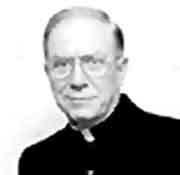 | Father Richard James Cleary was born and reared in Wichita. After graduation from Cathedral High School in 1947, he attended the seminary operated by the Benedictine monks of Conception Abbey in Northwestern Missouri. There he came to appreciate the life of the monks and, having obtained the permission of Bishop Mark Carroll of Wichita, he became a monk of that monastery. After being ordained a priest in 1955, his superiors sent him to get his master’s degree at the University of Ottawa, Canada, then to study in Athens, Greece, and then in Rome, Italy, where he obtained his doctor’s degree in Theology. Finally, he spent a year of study at Harvard University. Later, Fr. Cleary was assigned to teach for many years in Rome. In 1998, he returned to Wichita, where he served in parish ministry at St. Mary’s Cathedral and at Blessed Sacrament parishes. In 2001, his abbot (superior) transferred him to Arkansas, where he served as chaplain of the Benedictine Sisters of Holy Angels Convent in Jonesboro, and helped in the parishes of northeast Arkansas. In March 2010, he was re-assigned to his monastery, Conception Abbey, Conception, in Missouri 64433. He can be contacted there at, 660-944-2877, or by email: rjcleary@juno.com. |
Religion
2003-02-01 12:11:00
Why did God wait so long to send Jesus?
Question: I understand that God is all-knowing, which means that: at the time He created man, He knew He was going to send His Son several thousand years later to save believers. My questions are two: If He knew He was going to send His Son anyway, why didn't He do it initially? Since He did not, why did He wait so long to do it?
ANSWER: It is impossible for our finite, weak and limited intelligence to answer these and millions of other questions regarding God's life and knowledge and activity. We know about God only what He has deigned to tell us: by revelation in the Bible, by the evidence of his activity in this world, by the life and teaching of his Son Jesus, and by the teaching authority of the Church established by Jesus. In these sources of knowledge God has informed us about his plan in creating the world, and his plans for the salvation of some human beings. He created all human beings with the gifts of intelligence and free-will, and gave us directions about the use and mis-use of those gifts, supported by promises and warnings. God has not informed us about alternate plans He might have chosen. Indeed it is quite possible that, in another galaxy created by God, He sent His Son to live among intelligent beings right from the beginning, and those people have never sinned and enjoy perfect happiness. Or He might have created humans who have sinned and, like the devils, are condemned to eternal punishment without any hope for salvation. In regard to your second question: in his epistle to the Galatians (chapter 4, verse 4), St. Paul writes that "in the fullness of time God sent his Son" or, as the Good News Bible expresses it: "when the right time finally came, God sent his own Son." Why that period, 2006 years ago, happened to be the right time, we can only speculate without knowing for sure. It seems God had prepared the world for that precise time, through his sending various prophets beforehand and through the progress already achieved by human industry. For example, the conquests of Alexander the Great and his successors two centuries earlier had established through much of the world a good system of roads and mail and a common language, by means of which the Good News about the coming of God's Son into this world could be spread more rapidly than before. Of course, if God had waited until the present time, that Good News could be spread immediately. So we are back to your original question. The Book of Job proposes several basic questions, regarding life and death, sickness and health, poverty and wealth, the extent of this world, etc. in lengthy reflections and God does not give a precise answer to any of them. And thus Job concludes humbly: "I know, o Lord, that you are all powerful; that you can do everything you want. You ask how I dare question your wisdom, when I am so very ignorant. I talked about things I did not understand, about marvels too great for me to know." (Job 42:2-3). In reflecting about God's plans for the Jewish people in the history of salvation, St. Paul exclaims: "Who can explain God's decisions? Who can understand his ways? Who knows the mind of the Lord? For all things were created by him, and all things exist through him and for him. To God be the glory forever!" (Rom. 11:33-36).


